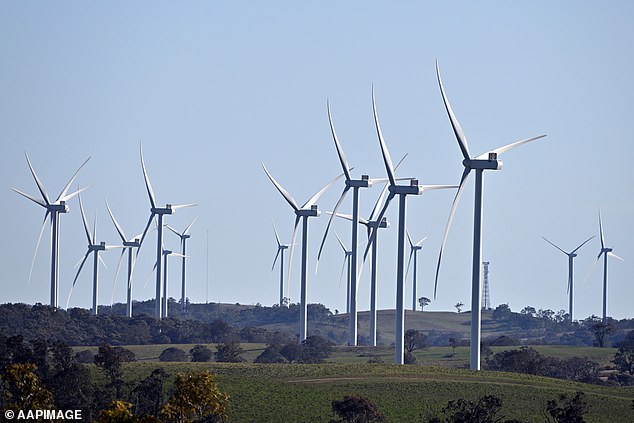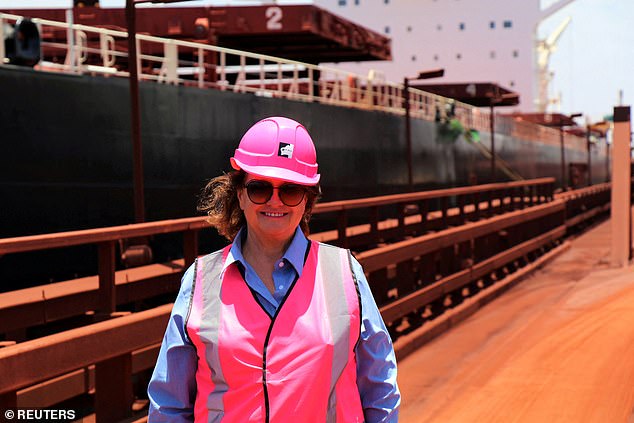Billionaire Gina Rinehart issues a chilling warning to Australia in a bold address: ‘My blood boils over on this one’
Gina Rinehart has issued a stark warning that Australians will face massive price increases and fresh food shortages unless the burden of climate change policies is lifted from farmers.
Speaking in Bali on Tuesday, the mining magnate made the ominous prediction to mark National Agriculture and Related Industries Day, of which Ms Rinehart is the founder and patron.
Australia’s richest person, who owns 9.2 million hectares of farmland, said governments must cap farmers’ spending on achieving net zero greenhouse gas emissions at $200,000 or face dire consequences.
“Otherwise farmers will have to leave farming, and as a result, Aussies will face huge food price increases and fresh food shortages,” Ms Rinehart said.
Mining magnate Gina Rinehart has warned of huge food price increases and even fresh food shortages due to climate change policies
Ms Rinehart, executive chairman of iron ore exporting giant Hancock Prospecting, said Australian agriculture is “the envy of much of the world” but is “haunted” by the costs of climate change policies.
“Don’t blame the farmer for trying to pass on the millions in costs they will all have to pass on to Australian households to install solar, batteries and millions for electric vehicles, and fines,” she said.
The billionaire mining heiress claimed that government burdens were too great and that interference fell most heavily on the “essential” primary industries of agriculture and mining.
She also expressed anger that, normally for environmental reasons, she was unable to clear land in a way that could curb forest fires, due to red tape.
“Government tape is drowning us, won’t even let us keep our families, staff, pets, homes and investments safe with adequate fire breaks, my blood boils over this,” she said.

Ms Rinehart said if the costs of moving towards net zero emissions were not contained, many farmers would give up farming
‘Fines and even prison if we try, the bureaucracy blocks or hinders us at every opportunity. Projects do not succeed because of the government, but in spite of the government.’
Ms Rinehart said governments focusing on the wrong things were hurting Australia.
“Giving in to the activism of minority groups, the left and the Greens, supported by signaling, are impacting political decisions and policies, rather than costs, common sense and economics,” she said.
“Unfortunately, politicians too often forsake common sense and real leadership for vocal public activism.”
She painted a picture of Australia as the ‘apex of greatness’ in the late 1960s to early 1970s.
‘The government was reluctant to take on debt, our nation developed well, migrants came mainly from Italy and Greece, and settled well, worked and contributed, in numbers who worked, and brought with them a desire to succeed in their new country. They don’t want the welfare of Australian taxpayers,” she said.
‘Our people were well educated, skilled and industrious. The government was much, much less intrusive and the welfare state as we know it today did not exist.’
However, she argued that everything changed with the election of the Whitlam Labor government in 1972.
‘Trade unions, impatient to claim an even greater share of what they saw as this prosperous future, helped elect a socialist government led by Gough.’
“Policies were introduced that favored unions and popular agendas over common sense.

Ms Rinehart is not only head of ore mining giant Hancock Prospecting, but also Australia’s largest landowner
In the speech, she also called for an end to “discriminatory restrictions on working hours” so that retirees, college students, veterans, disabled and non-violent, non-dangerous prisoners can help fill the labor shortage.
Ms Rinehart, who is worth an estimated $34.41 billion, is Australia’s largest landowner, with her properties making up about 1.6 percent of the continent’s landmass.
